
Kaskaskia is a village in Randolph County,Illinois. Having been inhabited by indigenous peoples,it was settled by France as part of the Illinois Country. It was named for the Kaskaskia people. Its population peaked at about 7,000 in the 18th century,when it was a regional center. During the American Revolutionary War,the town,which by then had become an administrative center for the British Province of Quebec,was taken by the Virginia militia during the Illinois campaign. It was designated as the county seat of Illinois County,Virginia,after which it became part of the Northwest Territory in 1787. Kaskaskia was later named as the capital of the United States' Illinois Territory,created on February 3,1809. In 1818,when Illinois became the 21st U.S. state,the town briefly served as the state's first capital until 1819,when the capital was moved to more centrally located Vandalia.
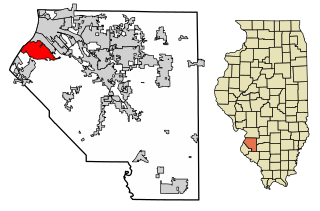
Cahokia is a settlement and former village in St. Clair County,Illinois,United States,founded as a colonial French mission in 1689. Located east of the Mississippi River in the Greater St. Louis metropolitan area,as of the 2010 census,15,241 people lived in the village. On May 6,2021,the village was incorporated into the new city of Cahokia Heights.
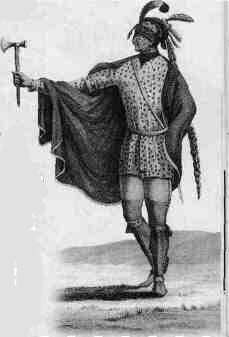
The Illinois Confederation,also referred to as the Illiniwek or Illini,were made up of 12 to 13 tribes who lived in the Mississippi River Valley. Eventually member tribes occupied an area reaching from Lake Michicigao (Michigan) to Iowa,Illinois,Missouri,and Arkansas. The five main tribes were the Cahokia,Kaskaskia,Michigamea,Peoria,and Tamaroa. The spelling Illinois was derived from the transliteration by French explorers of iliniwe to the orthography of their own language. The tribes are estimated to have had tens of thousands of members,before the advancement of European contact in the 17th century that inhibited their growth and resulted in a marked decline in population.
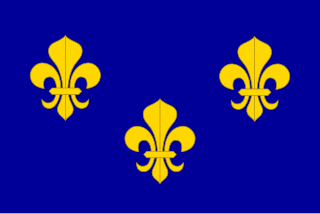
The Illinois Country —sometimes referred to as Upper Louisiana —was a vast region of New France claimed in the 1600s in what is now the Midwestern United States. While those names generally referred to the entire Upper Mississippi River watershed,French colonial settlement was concentrated along the Mississippi and Illinois Rivers in what is now the U.S. states of Illinois and Missouri,with outposts on the Wabash River in Indiana. Explored in 1673 from Green Bay to the Arkansas River by the Canadien expedition of Louis Jolliet and Jacques Marquette,the area was claimed by France. It was settled primarily from the Pays d'en Haut in the context of the fur trade,and in the establishment of missions from Canada by French Catholic religious orders. Over time,the fur trade took some French to the far reaches of the Rocky Mountains,especially along the branches of the broad Missouri River valley. The French name,Pays des Ilinois,means "Land of the Illinois [plural]" and is a reference to the Illinois Confederation,a group of related Algonquian native peoples.

Ninian Edwards was an American political figure who was prominent in Illinois. He served as the first and only governor of the Illinois Territory from 1809 to until the territory earned statehood in 1818. He was then one of the first two United States senators from the State of Illinois from 1818 to 1824,and the third Governor of Illinois from 1826 to 1830. In a time and place where personal coalitions were more influential than parties,Edwards led one of the two main factions in frontier Illinois politics.

John M. Reynolds was a United States lawyer and politician from the state of Illinois who served in all three governmental branches. One of the original four justices of the Illinois Supreme Court (1818–1825),he later won election several times to the Illinois House of Representatives and the United States House of Representatives,and as 4th Illinois Governor (1830–1834). He also took the rank of major general of the Illinois militia during the Black Hawk War.
The history of Illinois may be defined by several broad historical periods,namely,the pre-Columbian period,the era of European exploration and colonization,its development as part of the American frontier,its early statehood period,growth in the 19th and 20th centuries,and contemporary Illinois of today.
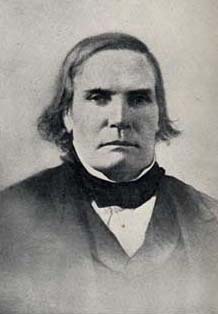
Jesse Burgess Thomas was an American lawyer,judge and politician who served as a delegate from the Indiana Territory to the tenth Congress and later served as president of the Constitutional Convention which led to Illinois being admitted to the Union. He became one of Illinois' first two Senators,and is best known as the author of the Missouri Compromise of 1820. After his retirement from the U.S. Senate in 1829 he lived the rest of his life in Ohio.
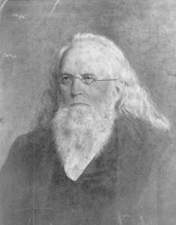
Sidney Breese,a lawyer,soldier,author and jurist born in New York,became an early Illinois pioneer and represented the state in the United States Senate as well as served as Chief Justice of the Illinois Supreme Court and Speaker of the Illinois House of Representatives,and has been called "father of the Illinois Central Railroad".
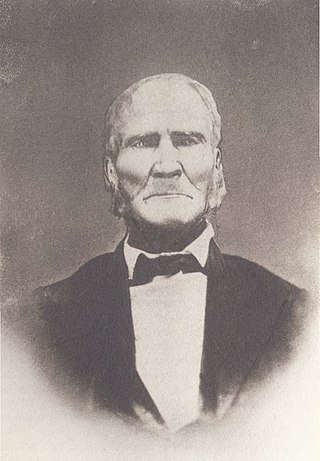
Samuel Whiteside was an Illinois pioneer. A farmer and backwoodsman,Whiteside briefly served in the Illinois General Assembly after statehood and led the Illinois militia for decades,rising to the rank of general but also enlisting as an ordinary soldier when militia calls declined at the end of wars. Whiteside fought the British in the War of 1812 and Native Americans through the Blackhawk War.

John Duff,born John McElduff,or John Michael McElduff,because early court records referred to him as John Michael Duff,was a counterfeiter,criminal gang leader,horse thief,cattle thief,hog thief,salt maker,longhunter,scout,and soldier who assisted in George Rogers Clark's campaign to capture the Illinois country for the American rebel side during the Revolutionary War.
John R. Lindgren(February 20,1855 –April 29,1915) was an American banking executive.

Erland Carlsson was a Swedish-American Lutheran minister. He was one of the founders and served as president of the Augustana Lutheran Synod.
Charles Magnus Lindgren was a Swedish born,American shipping executive. He was a pioneer in the Great Lakes shipping industry.

Slavery in what became the U.S. state of Illinois existed for more than a century. Illinois did not become a state until 1818,but earlier regional systems of government had already established slavery. France introduced African slavery to the Illinois Country in the early eighteenth century. French and other inhabitants of Illinois continued the practice of owning slaves throughout the Illinois Country's period of British rule (1763–1783),as well as after its transfer to the new United States in 1783 as Illinois County,Virginia. The Northwest Ordinance (1787) banned slavery in Illinois and the rest of the Northwest Territory. Nonetheless,slavery remained a contentious issue,through the period when Illinois was part of the Indiana Territory and the Illinois Territory and some slaves remained in bondage after statehood until their gradual emancipation by the Illinois Supreme Court. Thus the history of slavery in Illinois covers several sometimes overlapping periods:French;British;Virginia;United States Northwest Territory (1787–1800),Indiana Territory (1800–1809),Illinois Territory (1809–1818) and the State of Illinois.
Conrad Will was an American physician,politician,and pioneer who is the namesake of Will County,Illinois. Born in Pennsylvania,Will studied medicine in a town in the western portion of the state before moving to Illinois. His farm in Jackson County,Illinois became the first county seat there. Will co-authored the Constitution of Illinois in 1818 and then served in the Illinois Senate for the 1st Illinois General Assembly. Will remained in one of the two houses of the general assembly until his death. The following year,Will County was named in his honor.

George Cadwell was an American pioneer,politician,and physician from Connecticut. After Cadwell studied medicine in Vermont,he married a daughter of Matthew Lyon. He left with Lyon to Kentucky,but then settled in the Indiana Territory after a dispute about slavery. He served in the government of Madison County,then was elected to the Illinois Senate when the state was founded in 1818. He served three two-year terms,then resumed the practice of medicine.

Swedes constitute a considerable ethnic group in Chicago,where a little over 15,000 people are of Swedish ancestry.
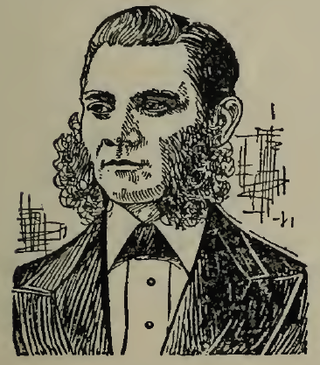
Carl August Björk was a Swedish missionary preacher in the Midwestern United States. He was the founder of the Mission Friends –some of which later developed into the Evangelical Covenant Church,a Radical Pietistic Christian denomination with Lutheran roots,which he played a key role in founding. Björk served as the first president of the Swedish Evangelical Mission Covenant Synod.

Ernst Wilhelm (William) Olson was a Swedish-American journalist,publicist,writer,and translator. He has been described as "one of Swedish-America's foremost literary figures".















